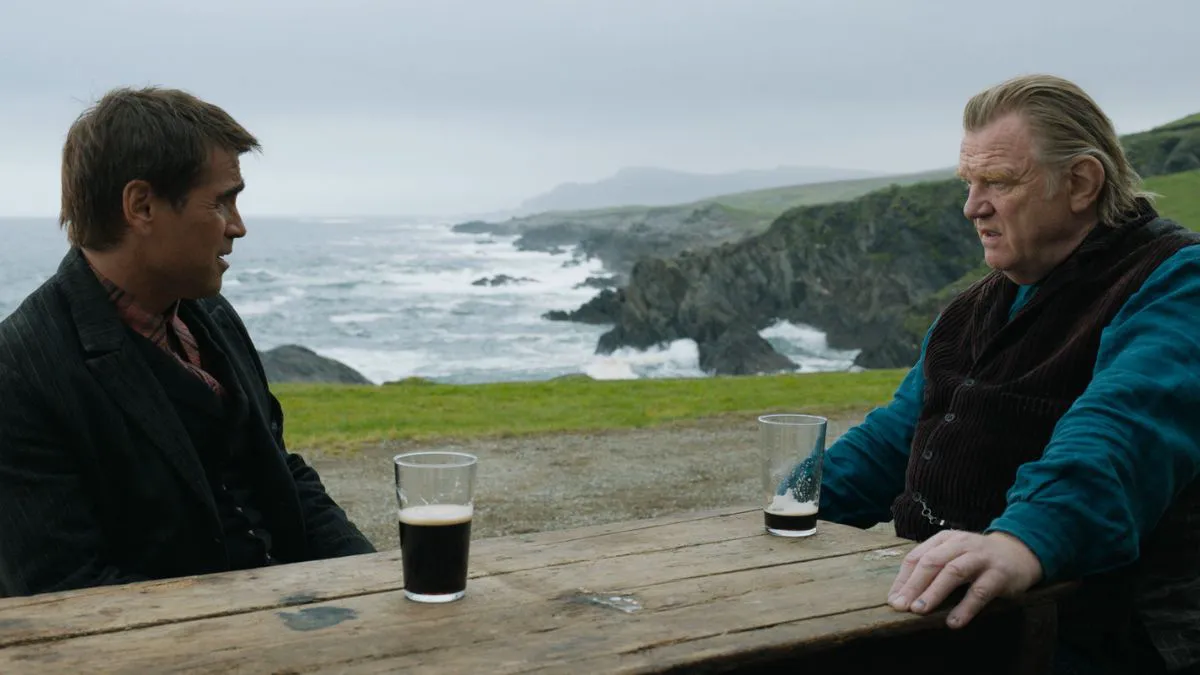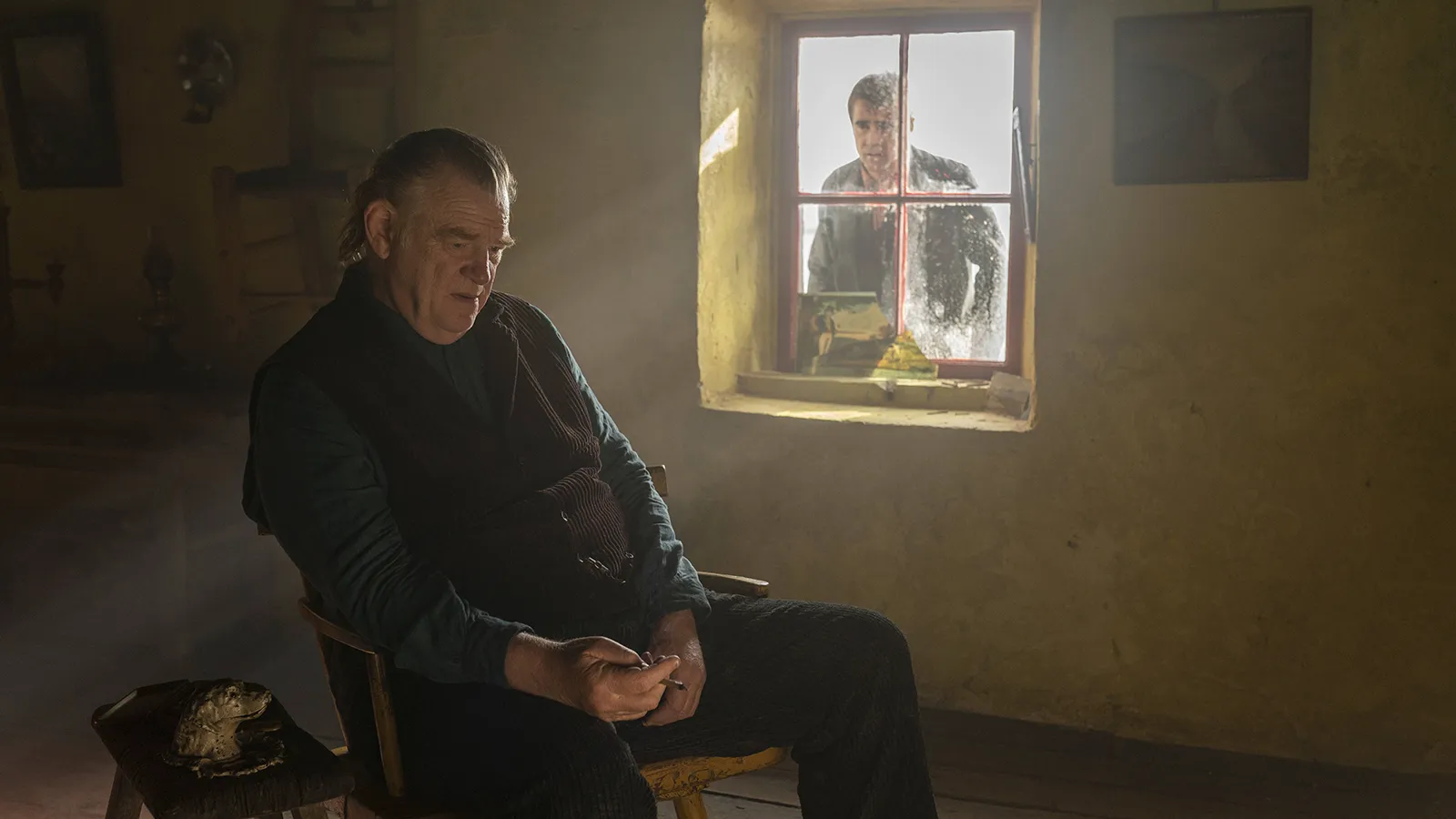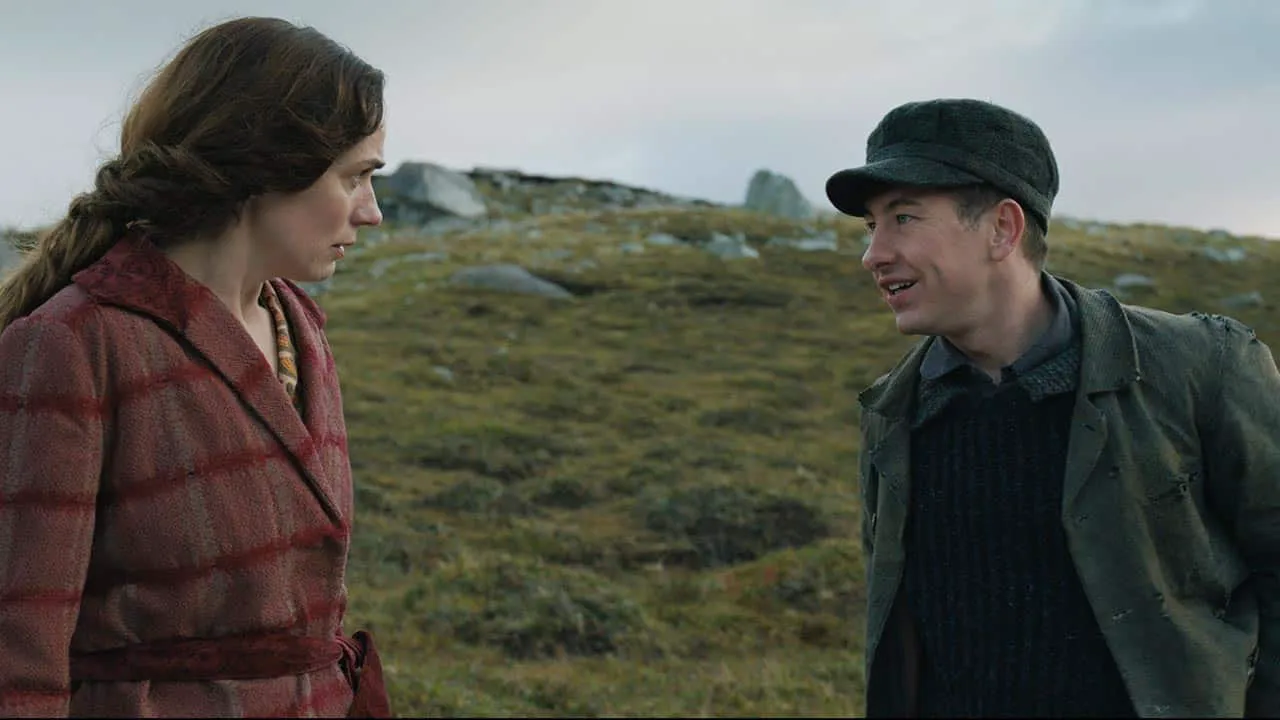The Banshees of Inisherin: When Existential Dread Arrives in a Small Irish Town
In 1923, amidst the backdrop of the Irish Civil War, life on the remote island of Inisherin unfolds with a quiet rhythm. Home to a close-knit community of about a hundred souls, evenings are spent in the local pub, filled with music, drink, and conversations that meander between the profound and the mundane. It’s here that we find Pádraic Súilleabháin (Colin Farrell), a simple shepherd, and Colm Doherty (Brendan Gleeson), a talented fiddler, whose once inseparable friendship takes a sudden, dark turn. Colm, grappling with the fleeting nature of existence, decides he can no longer afford to waste time on idle chatter. He abruptly ends his friendship with Pádraic, threatening to cut off one of his own fingers each time Pádraic attempts to speak to him.

Colin Farrell as Pádraic Súilleabháin in “The Banshees of Inisherin”
Martin McDonagh, fresh off his success with the thought-provoking “Three Billboards Outside Ebbing, Missouri,” ventures into the realm of the philosophical tale with “The Banshees of Inisherin.” The film earned him the Best Screenplay award at the Venice Film Festival, while Colin Farrell took home the Volpi Cup for Best Actor. It’s always a delight to see a director who can captivate mainstream audiences before delving into more complex styles that resonate with festival aficionados, a feat also achieved by Edgar Wright. McDonagh initially charmed viewers with his dry, sarcastic, working-class humor, and now captivates with his portrayal of a bewildered man facing an existential crisis.
The Melancholy of Inisherin
While McDonagh’s earlier works like “In Bruges” and “Seven Psychopaths” subtly hinted at deep, inexplicable melancholy amidst the chaos of shootouts and witty banter, “The Banshees of Inisherin” sees sadness gradually permeating the entire village. Colm is the first to succumb, jolted by a sudden realization of life’s futility. He tells Pádraic that while a good name fades with time, music endures. Thus, Colm dedicates himself to composing “The Banshees of Inisherin,” a piece that may not be a masterpiece, but whose creation holds immense personal significance for him.
These spiritual struggles are lost on Pádraic, a man unaccustomed to pondering his existence. He is simply a good man, and that is enough for him. He only shares Colm’s feelings during moments of piercing loneliness, which terrify him to his core. Pádraic persistently seeks to understand the reasons behind Colm’s abrupt rejection, failing to grasp the importance of their relationship. The answer is devastating: without his friend, Pádraic is left alone with a life of perceived failure, having achieved little by the age of fifty. Characters similar to Pádraic have appeared in McDonagh’s previous works (often played by Sam Rockwell), but they reveled in their sincerity and foolishness, unconcerned with the consequences of their actions. In “The Banshees of Inisherin,” this simpleton is confronted with an existential crisis he cannot overcome on his own.

Brendan Gleeson as Colm Doherty in “The Banshees of Inisherin”
Echoes of Despair
Mildred from “Three Billboards Outside Ebbing, Missouri” found herself trapped in a similar cycle of despair, unable to escape the corrosive emotions that consumed her: grief for her murdered daughter and a burning desire for revenge. No matter what she did, the dead could not be brought back. This humanistic message is typical of McDonagh, and in “The Banshees of Inisherin,” he seems to be venturing into the uncertain territory of existential drama. The emptiness that Pádraic confronts has been felt by other characters in McDonagh’s films: it could be heard in Sheriff Bill’s suicidal gunshot (Woody Harrelson; “Three Billboards”), in the tragic fate of Hans (Christopher Walken; “Seven Psychopaths”), or in the unending guilt of Ray (Colin Farrell; “In Bruges”). However, only in “The Banshees” can one truly feel the fear of a life unfulfilled.

Kerry Condon in “The Banshees of Inisherin”
All the characters in the film live on their small island and hear distant explosions of guns - echoes of the war that do not bother them at all. This plot element is important to the director, who made the film in a year of endless storms: the storming of the Capitol in the USA, the revolution in Myanmar, the capture of Afghanistan by terrorists and many other high-profile events. They resemble military cannonades, suppressing any feelings and emotions with noise. But the echo of the explosions barely reaches the island of Inisherin, so Pádraic and Colm do not even think about events of national importance. For them, the big land is something distant and unknown, where only Pádraic’s sister Shivon (Kerry Condon) dares to go. It combines the features of the two main characters: she is just as aware of the futility of existence, but chooses life, despite everything. Men, as is customary with McDonagh, choose death because of helplessness, but at the very end they take a step back.
A Touch of the Mythical
The only flaw in “The Banshees of Inisherin” is its reliance on cliché-ridden pathos. McDonagh revels in the beautiful shots of Ireland’s wild nature, employs fairy-tale motifs and characters, and even includes a significant donkey figure, a hallmark of mystical cinema (from Buñuel’s “An Andalusian Dog” to Enyedi’s “My Twentieth Century”). Without these elements, the author would have created a pure drama on his favorite theme: the human reaction to emotional torment. As a true humanist, Martin McDonagh arrives at one conclusion: darkness exists in everyone, but light will always be greater, even if the sound of cannons is heard in the distance.